-

《念奴娇·赤壁怀古》说课稿(二) 2022-2023学年统编版高中语文必修上册
读,是学生接触作品最直接的方式。初读词作,让学生听示范读,并且在课本注解的提示下,解决词作的读音问题。再进一步了解词人情况、本词的创作背景以及怀古咏史诗词的基本情况。通过齐读的方式,亲身感受词作的音韵之美。读,是放飞想象的最好方式。再读词作,通过诵读上阙内容,想象上阙描绘了一幅什么样的情景?用了哪些富有表现力的词来极力描绘这些景象?呈现出何种意境?有何作用?并且利用智慧课堂进行填空和选择。读,是把握内容的最有用的方式。通过智慧课堂随机选择,引导学生分角色诵读下阙,分析三国时的周瑜与此时的词人苏轼的形象。在对比中,感受周瑜的情场、官场、战场,场场得意的情况,和苏轼的黄州、惠州、儋州,州州失意的人生境遇。理解周瑜之于苏轼而言,是某种程度上热切向往的和难以企及的梦。读,也是赏析体悟作品主要方式。学生再次齐读下阙,赏析词作最后两句“人生如梦,一尊还酹江月”表达了作者怎样的情感?来完成本篇内容的学习。
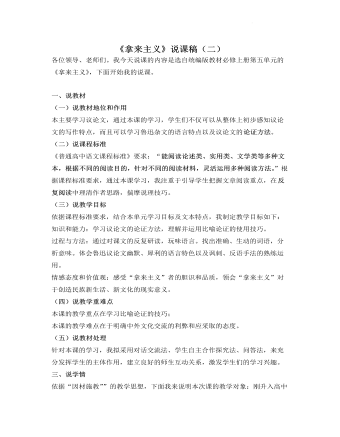
《拿来主义》说课稿(二) 2021-2022学年统编版高中语文必修上册
四、说教学过程(一)结合现实、自然导入随着我国开放的深入发展,国外的科学、文化、技术以及资产阶级的腐朽思想,生活作风等等也随之大量涌来,我们应采取怎样的态度和方法才是正确的呢?鲁迅先生在30年代就继承文化遗产问题曾写过一篇杂文,我们可以从中获得那些启示呢?(二)整体感知、疏瀹文意1.请同学介绍“我所知道的鲁迅”,教师补充写作背景。教师有针对性的进行预习检查,能促使学生养成课前预习的习惯。2.理清文章的思路,分析文章的整体结构教师范读课文,针对较难的字音进行正读。学生快速浏览课文,把握全文框架,小组讨论后分出层次。(让学生通过自主合作探究来概括文意可以让同学们参与到教学活动中,锻炼学生实际动手能力)
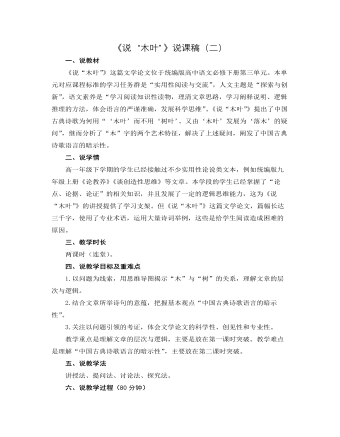
《说“木叶”》说课稿(二) 2021-2022学年统编版高中语文必修下册
一、说教材《说“木叶”》这篇文学论文位于统编版高中语文必修下册第三单元。本单元对应课程标准的学习任务群是“实用性阅读与交流”,人文主题是“探索与创新”,语文素养是“学习阅读知识性读物,理清文章思路,学习阐释说明、逻辑推理的方法,体会语言的严谨准确,发展科学思维”。《说“木叶”》提出了中国古典诗歌为何用“‘木叶’而不用‘树叶’、又由‘木叶’发展为‘落木’的疑问”,继而分析了“木”字的两个艺术特征,解决了上述疑问,阐发了中国古典诗歌语言的暗示性。二、说学情高一年级下学期的学生已经接触过不少实用性论说类文本,例如统编版九年级上册《论教养》《谈创造性思维》等文章。本学段的学生已经掌握了“论点、论据、论证”的相关知识,并且发展了一定的逻辑思维能力,这为《说“木叶”》的讲授提供了学习支架。但《说“木叶”》这篇文学论文,篇幅长达三千字,使用了专业术语,运用大量诗词举例,这些是给学生阅读造成困难的原因。
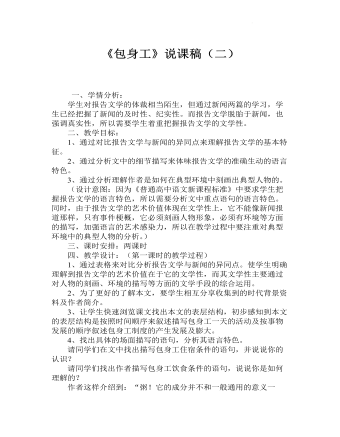
《包身工》说课稿(二) 2021-2022学年统编版高中语文选择性必修中册
3、通过分析理解作者是如何在典型环境中刻画出典型人物的。(设计意图:因为《普通高中语文新课程标准》中要求学生把握报告文学的语言特色,所以需要分析文中重点语句的语言特色。同时,由于报告文学的艺术价值体现在文学性上,它不能像新闻报道那样,只有事件梗概,它必须刻画人物形象,必须有环境等方面的描写,加强语言的艺术感染力,所以在教学过程中要注重对典型环境中的典型人物的分析。)三、课时安排:两课时四、教学设计:(第一课时的教学过程)1、通过表格来对比分析报告文学与新闻的异同点。使学生明确理解到报告文学的艺术价值在于它的文学性,而其文学性主要通过对人物的刻画、环境的描写等方面的文学手段的综合运用。2、为了更好的了解本文,要学生相互分享收集到的时代背景资料及作者简介。3、让学生快速浏览课文找出本文的表层结构,初步感知到本文的表层结构是按照时间顺序来叙述描写包身工一天的活动及按事物发展的顺序叙述包身工制度的产生发展及膨大。
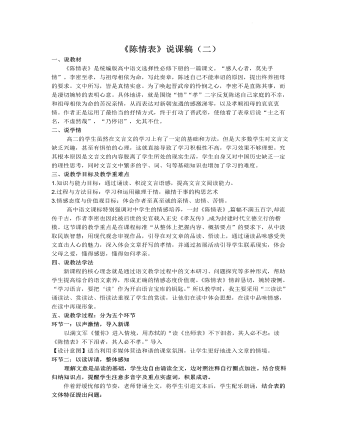
《陈情表》说课稿(二) 2021-2022学年统编版高中语文选择性必修下册
概括出祖母的形象:祖母是一位对我恩重如山,身缠重病,风烛残年的老人。(紧扣“婴”,)了解作者身世:“生孩六月,慈父见背;行年四岁,舅夺母志。祖母刘,悯臣孤弱,躬亲抚养。臣少多疾病,九岁不行,零丁孤苦,至于成立。既无伯叔,终鲜兄弟;门衰祚薄,晚有儿息。外无期功强近之亲,内无应门五尺之僮。茕茕孑立,形影相吊。”(概括明确:“孤苦”“孤弱”,突出“孤”)【先分析“应该尽忠”和“不得不去尽忠”,再分析“不能去尽忠”,避免了串讲课文的平淡与枯燥,使课堂有了波澜。】(三)追问探究,察理析忠孝问题:只说自身孤苦、祖母多病是“以情动人”,或许能打动一个君王,但是对于像晋武帝这样一个君王就很难说了。晋武帝究竟是一个什么样的君王?李密又是用什么理由说服他的呢?其间体现了作者怎样的机变和才智呢?
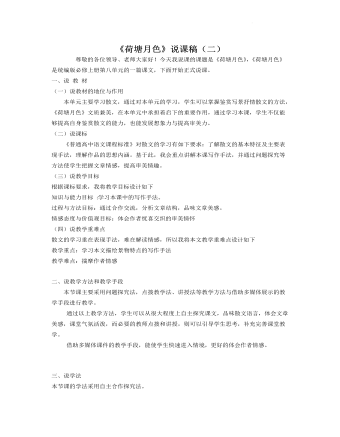
《荷塘月色》说课稿 (二)2021-2022学年统编版高中语文必修上册
本环节利用多媒体展示的教学手段,通过创设优美的情景来渲染气氛,引导学生接受美的熏陶,增强学生学习兴趣。教师先播放莲花的图片,让学生们谈谈自己联想到的诗词曲赋或文章,来激发学生的学习热情,随后教师总结,引出现代写荷花的名篇《荷塘月色》,从而导入新课。导语部分的设计既给了学生美感享受又自然的导入了新课。(二)初读文本,把握结构本环节主要采用了小组合作法让学生以小组合作的形式探索文章夜游顺序和情感变化这两条线索发展,教师适当的进行点拨,让学生通过探索文章线索完成对本课“圆形结构”把握。目的是发挥学生主导作用,自主学习、把握文章结构美。(三)选读文本,分析手法在本环节中主要运用讲授法和问答法。让学生反复诵读课文第4、5、6段,找出作者使用修辞手法修饰了的景物,随后师生问答作者运用了什么修辞手法来描写“荷塘”“月色”“荷花”“荷香”等景物的,又达到了什么样的效果呢?最后由教师来具体讲解本文中学生不熟悉的写作手法(如:通感)。

《蜀道难》说课稿(二) 2021-2022学年统编版高中语文选择性必修下册
(二)整体感知(7分钟) 读—读文见义“新课标”要求要在语文教学中要突出整体感知。古人云:书读百遍,其义自见。诗歌学习重在诵读,高中语文新课标对诗歌阅读的要求是:加强诵读涵泳,在诵读涵泳中感受其思想、艺术魅力,获得情感的体验、心灵的共鸣和精神的陶冶。初步感知:此环节先由学生跟着范读阅读《蜀道难》,解决字音字意等基本问题,根据学生的自我感觉完成最为感性的诗歌认识,直接而感性的阅读,培养的是学生的自我语言感受。之后将利用幻灯片给学生展示蜀道各式各样的图片,让学生直观的感受蜀道之险,在此基础上播放动画音频,从而使学生深入理解诗歌情感,进一步感受李白诗歌浪漫奇特的艺术风格。(三)深入赏析(65分钟) 探—探究鉴赏“新课标”要求培养学生自主、合作、探究的精神。基于整体感知诗歌后,我将进一步引导学生分析和鉴赏诗歌。首先,苏格拉底说,教育不是灌输,而是点燃火焰。
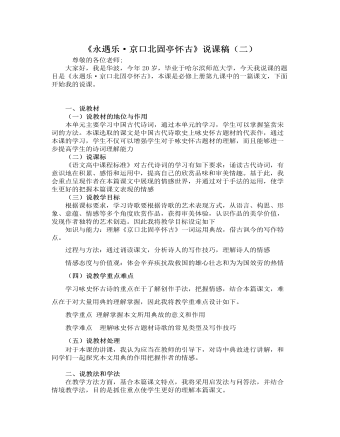
《永遇乐 · 京口北固亭怀古》说课稿(二) 2021-2022学年统编版高中语文必修上册
此环节运用的是合作探究法,采用小组讨论的形式开放回答即可。通过本课的学习,学生可以总结归纳出辛弃疾主张抗敌,收复失地的爱国热情对南宋政府苟且偏安的不满,吸取的历史教训,告诫当使用者不要草率用兵。对于决策者提出警告,抒发自己壮志难酬的感慨,教师总结归纳即可。本诗写出最大特点就是大量典故的运用。学生可以本诗对用点表达自己的看法,我将在在PPT展示诗歌用典的意义,意在帮助学生理解更好用典这种诗歌技巧。本篇是一首咏史怀古诗,本单元学习了两首同题材诗歌,有必要使学生掌握一类型的诗歌鉴赏方法。(五)比较阅读 品味历史这一环节PPT将展示上次课程学习的《念奴娇赤壁怀古》并从内容,形式等角度分析异同,采用提问的方法。此环节结束后简要归纳咏史怀古诗类型。目的是巩固加强对于咏史怀古题材诗歌理解,理解归纳咏史怀古诗题材类型。(六)布置作业 巩固感知鉴赏李白《越中览古》我将采用习题的形式,目的是使学生在实践中运用所学方法鉴赏咏史怀古诗。
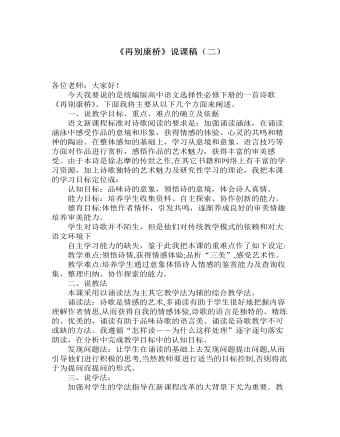
《再别康桥》说课稿(二) 2021-2022学年统编版高中语文选择性必修下册
康桥风光、剑桥大学风貌(配上剑桥的优美图片,让学生从视觉上对课文有一定的感知,帮助理解诗人的“康桥情结”)2.诵读体味(教学重点的解决)先让学生自由朗诵。要求学生谈谈对全诗的整体感受教师稍加点拨,答案不需标准,只要整体把握正确即可。然后逐字逐句指导朗诵并结合作者独特的人生际遇分析本诗所体现的诗情和艺术上的“三美”,从而达到准确把握作品主旨的目的。这种引导是循序渐进的,也符合学生的认知规律。简介诗歌“三美”追求闻一多先生是我国现代文学史上集诗人、学者和斗士于一身的重要诗人。他不但致力于新诗艺术美的探索,提出了音乐美(音节)、绘画美(词藻)、建筑美(节的匀称和句的均齐)的诗歌\"三美\"的新格律诗理论主张,还努力进行创作实践,写出了许多精美诗篇。他的新格律诗理论被后人称为现代诗学的奠基石,影响深远。
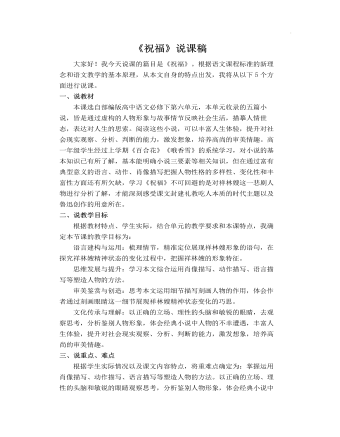
《祝福》说课稿(二) 2021-2022学年统编版高中语文必修下册
三、说重点、难点 根据学生实际情况以及课文内容特点,将重难点确定为:掌握运用肖像描写、动作描写、语言描写等塑造人物的方法。以正确的立场、理性的头脑和敏锐的眼睛观察思考,分析鉴别人物形象,体会经典小说中人物的不幸遭遇,从而提升对社会现实观察、分析、判断的能力。四、说教学方法 1.教法根据学生的这些情况,我采用了以下的教法:⑴创设情境法。通过创设“探究祥林嫂之死”阅读情境与任务,激发学生阅读兴趣,引导学生发挥主观能动性,逐层深入阅读、鉴赏与探究。⑵点拨法。适当点拨,引导学生回忆以往学过塑造人物形象的方法等相关知识。 ⑶当堂训练法。通过让学生用语言描述不同时期祥林嫂的眼睛特点,检测学生的感悟情况,判断学生对所学内容的接受程度。2.学法本节课充分发挥学生主体作用,引导学生自主学习,探究式学习。具体方法如下:(1)课前预习(此文长达万余字,难以做到在课堂上让学生通读全文,需要提前布置课前预习任务,培养学生阅读的自觉性。)
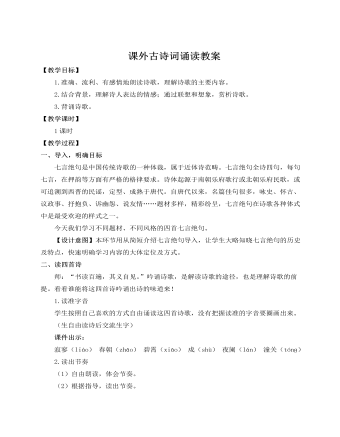
人教部编版七年级语文上册课外古诗词诵读(二)教案
材料二:锦瑟无端五十弦,一弦一柱思华年。庄生晓梦迷蝴蝶,望帝春心托杜鹃。沧海月明珠有泪,蓝田日暖玉生烟。此情可待成追忆?只是当时已惘然。(李商隐《锦瑟》)相见时难别亦难,东风无力百花残。春蚕到死丝方尽,蜡炬成灰泪始干。晓镜但愁云鬓改,夜吟应觉月光寒。蓬山此去无多路,青鸟殷勤为探看。(李商隐《无题》)材料三:《十一月四日风雨大作》(其二)作于南宋光宗绍熙三年(1192)十一月四日。陆游自南宋孝宗淳熙十六年(1189)罢官后,闲居家乡山阴农村。当时诗人已经68岁,虽然年迈,但爱国热情丝毫未减,日夜惦念报效国家,可诗人收复国土的强烈愿望,在现实中已不可能实现,于是,在一个“风雨大作”的夜里,诗人触景生情,由情生思,在梦中实现了自己金戈铁马驰骋中原的愿望。死去元知万事空,但悲不见九州同。王师北定中原日,家祭无忘告乃翁。(陆游《示儿》)材料四:清朝同治四年(1865),谭嗣同出生于北京宣武城,其父谭继洵时任湖北巡抚。光绪元年(1875),谭嗣同10岁时,拜浏阳著名学者欧阳中鹄为师。
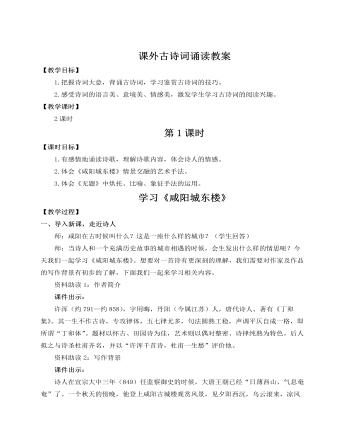
人教部编版语文九年级上册课外古诗词诵读(二)教案
课件出示:少年时指青年时期,从辛弃疾的生平看,这时的他正处于金人统治区内,看到沦陷区的人们在异族的奴役之下,作为血气方刚的爱国青年,油然而生收复失地的报国之志。因而这时的愁情也是真实存在的,那就是对沦陷区人民的同情,对国土沦丧的耻辱感,这时的愁,更多的是一种渴望收复中原、建立不世功业的志愿和动力,是昂扬而充满激情的。2.深入思考,体会“愁”的含蓄之美(1)比较少年时登楼与而今登楼的目的有何不同?预设:少年时登楼,是为了登高望远,抒发自己的豪情壮志。而今登楼,是为了排遣内心的悲愤之情。(2)是什么原因使词人“欲说还休”?预设:统治者处处排挤、打击他,他处处受猜忌,所以有愁不敢说。更主要的原因是,一生抱负付之流水,鬓发苍苍,功业无成,而又没有知音,无人理解。这种孤独的愁情,跟谁诉说,说了又有什么用,这中间也包含着对南宋朝廷的无限失望。因为这种失望,所以辛弃疾“欲说还休”。
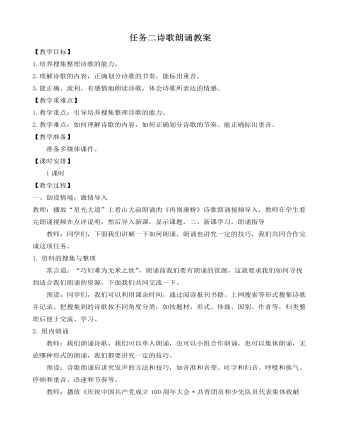
人教部编版语文九年级上册任务二诗歌朗诵(2)教案
1.主持人致开幕词。2.参赛选手按时到场、抽签。3.主持人介绍比赛规则和评分细则。(1)分年级比赛,各年级同时进行,并根据相同的评分标准来评奖。(2)比赛规则:①参赛选手须使用普通话,尽可能脱稿朗诵,并富有感情色彩,辅以丰富的肢体语言;②每位选手比赛时间限定在3-5分钟,如果超时或不足,评委将适当扣分;③比赛顺序由抽签决定,中途不得变更顺序,比赛需紧凑进行,选手上场迟到2分钟以上则视为弃权;④参赛选手须严格遵守比赛规则,在比赛过程中若有异议,由评委会裁定。4.主持人报幕,请选手上台朗诵。5.比赛结束后,邀请评委上台发言,工作人员进行统分。6.主持人宣布比赛结果,请嘉宾为获奖者颁奖。7.主持人宣布本次比赛结束,请嘉宾和评委退场。四、课后巩固,布置作业1.布置学生课后搜集艾青的一篇经典的、适合个人朗诵的诗歌,在课下作朗诵练习。

新人教版高中英语必修3Unit 1 Festivals and Celebrations-Reading for writing教学设计二
Step 3 Analyzing article structureActivity 31. Teachers raise questions to guide students to analyze the chapter structure of this diary and think about how to describe the festival experience. (1)What should be included in the opening/body/closing paragraph(s)?(2)How did the writer arrange his/her ideas?(3)What kind of interesting details did the writer describe?(4)How did the writer describe his/her feelings/emotions during the event?2. Students read and compare the three sentence patterns in activity 2. Try to rewrite the first paragraph of the diary with these three sentence patterns. After that, students exchange corrections with their partners. Such as:●This was my first time spending three days experiencing the Naadam Festival in China’s Inner Mongolia Autonomous Region and it was an enjoyable and exciting experience. ●I'll never forget my experience at the Naadam Festival because it was my first time to watch the exciting Mongolian games of horse racing, wrestling, and archery so closely. ●I'll always remember my first experience at the Naadam Festival in China’s Inner Mongolia Autonomous Region because it was so amazing to spend three days witnessing a grand Mongolian ceremony. Step 4 Accumulation of statementsActivity 41. Ask the students to read the diary again. Look for sentences that express feelings and emotions, especially those with the -ing form and the past participle. Such as:● …horse racing, wrestling, and archery, which are all so exciting to watch. ● some amazing performances● I was surprised to see…● I was a little worried about. . . ● feeling really tiredOther emotional statements:●I absolutely enjoyed the archery, too, but the horse races were my favourite part. ●I'm finally back home now, feeling really tired, but celebrating Naadam with my friend was totally worth it. ●He invited me back for the winter to stay in a traditional Mongolian tent and cat hot pot. I can’t wait!2. In addition to the use of the -ing form and the past participle, the teacher should guide the students in the appreciation of these statements, ask them to memorize them, and encourage them to use them reasonably in writing practice.

新人教版高中英语必修3Unit 4 Space Exploration-Listening&Speaking&Talking教学设计二
The themes of this part are “Talk about how to become an astronaut” and “Talk about life in space”. As Neil Armstrong said “Mystery creates wonder and wonder is the basis of man’s desire to understand. Space is difficult for human to reach, therefore, humans are full of wonders about it. However, if wanting to achieve the dream of reaching the Moon, some of our human should work hard to be an astronaut at first. Part A(Talk about how to become an astronaut) is a radio interview in a radio studio, where the host asked the Chinese astronauts about his story how to become an astronaut. Yang Liwei told his dreamed to be an astronaut since childhood. Then he worked hard to get into college at 22. The next 10 years, he gradually became an experienced pilot. At the same time, to be an astronaut, he had to study hard English, science and astronomy and trained hard to keep in good physical and mental health and to practise using space equipment. Part B (Talk about life in space) is also an interview with the astronaut Brown, who is back on the earth. The host Max asked about his space life, such as his emotion about going back the earth, the eating, shower, brushing, hobbies and his work. Part A and Part B are interviews. So expressing curiosity about the guests’ past life is a communicative skill, which students should be guided to learn.1. Students can get detailed information about how Yang Liwei became an astronaut and Max’s space life.2. Students learn to proper listening strategy to get detailed information---listening for numbers and taking notes.3. Students can learn related sentences or phrases to express their curiosity like “ I wish to know...” “I’d love to know...”4. Students can learn more about the space and astronauts, even be interested in working hard to be an astronaut

新人教版高中英语必修3Unit 4 Space Exploration-Reading and Thinking教学设计二
The theme of this unit focuses on “space exploration.” Students will learn about the training and experience needed to become an astronaut. The text is mainly about the development of space exploration. On the one hand, the text helps students to have a good understanding about the great feats humans have achieved, on the other hand, they will further understand the contributions that we Chinese have achieved, and feel confident and proud about our homeland and strengthen their love for our country. The teacher should instruct students to aim high and study harder to make great progress in the space career if possible.1. Read about the development and value of space exploration.2. Explore the mysteries of the universe and the achievements in space exploration.3. Skillfully use the vocabulary of this text to cultivate self-study ability 4. Develop cooperative learning ability through discussion.1. Enable the Ss to talk about the development and value of space exploration.2. Guide the Ss to summarize the main idea of each paragraph as well as the main idea of the text.3. Help Ss comprehend the main reasons for space exploration. Multi-media, textbook, notebooks.Step 1: Warming up and predictionLook at the title and the pictures of the text and predict what the text will be about?2. What are the main reasons for space exploration?

新人教版高中英语必修3Unit 4 Space Exploration-Reading for Writing教学设计二
⑦在我看来, 探索太空是值得的。As far as I am concerned, it is worthwhile to explore the space.Step 10 Writing---draftRecently, students in our class have had heated a discussion on whether space is worth exploring. Students hold different ideas about it.30% of us think space exploration is not worthwhile. They think space is too far away from us and our daily life and is a waste of money. And the money spent on space exploration can be used to solve the earth’s problems such as starvation and pollution.On the other hand,70% think space is worth exploring because we have benefited a lot from it,such as using satellites for communication and weather forecast. What’s more,with further space research,we may solve the population problem by moving to other planets one day. Also,space research will enable us to find new sources to solve the problem of energy shortages on the earth.As far as I am concerned, it is worthwhile to explore the space. Not only can it promote the development of society but also enrich our life. Step 11 Pair workExchange drafts with a partner. Use this checklist to help your partner revise his/her draft.1.Does the writer explain why he/she changed/wanted to change?2.Does the writer tell how the changes have improved or will improve his/her life?3.Is the text well-organised?4.Does the writer use words and expressions to show similarities and differences?5.Are there any grammar or spelling errors?6.Does the writer use correct punctuation?

新人教版高中英语必修3Unit 5 The value of money-Reading and Thinking教学设计二
? Could you offer me some kind of work here?? I don’t want your charity, I just want an honest job.? Careless: I landed in Britain by accident.Step 7:Consolidation.? Find Henry? Roderick and Oliver were I .making a bet when they saw Henry, a poor young man. ? Know Henry? About a month ago, Henry was sailing and later he found himself carried out to sea by a strong wind. Fortunately, he 2.was spotted by a ship. And it was the ship that brought him to 3.England? Offer money to Henry ? Oliver and Roderick gave Henry a letter and told him that there was money in it. They 4.persuaded him to accept it, and made him 5.promise that it wouldn't be opened until 2 o'clock.Step 8:Language pointsa large amount of: a large quantity of; a great deal ofe.g. They bought a large amount of furniture before they moved their new house.make a bet: make an arrangement to risk money, etc. on an event of which the result is doubtful.e.g. We made a bet on the result of the match.permit sb to do something: allow somebody to do somethinge.g. My mother doesn’t permit me to ride in the street after it rained.by accident: as a result of chancee.g. I only found it by accident.stare at: look at somebody or something with the eyes wide open in a fixed gaze( in astonishment, wonder, fear, etc)to be honest: to tell you the truth; to be franke.g. To be honest, I don’t think we have a chance of winning.Step7 Homework:What do you think will happen to Henry? Will the bank-note help him or get him into trouble?

新人教版高中英语必修3Unit 5 The Value of Money-Reading for Writing教学设计二
2. 您能看到, 我头发太长了。You can see that my hair is much too long.3. 无论什么时候, 只要您想回来就回来。Please come back whenever you want.4. 您仅有很少的头发要理! You only have too little hair to cut !5. 为您服务是我的荣幸!It is my honour to serve you!Step 9 Writing(Henry is walking down the street when he sees a sign for a place that cuts hair. He decides to have it cut. )H=Henry B=BarberH: Good afternoon, I’d like to have my hair cut, if I may. (The barber looks at Henry’s hair and continues cutting another man’s hair. ) Er, I’d really like a haircut. As you can see it’s much too long. B: (in a rude manner) Yes, I can see that. Indeed, I can. H: Fine, well, I’ll have a seat then. (He sits in one of the barber’s chairs. The barber turns to look at Henry. )B: It’s quite expensive here, you know! Are you sure you can afford it?H: Yes. I think so. (After his hair is cut, the barber tells Henry how much he must pay. Henry shows the barber the bank note. )B: Why Mr. . . (looks shocked)H: Adams. Henry Adams. I’m sorry. I don’t have any change. B: Please don’t worry! (wearing a big smile) Nothing to worry about! Nothing at all! Please come back whenever you want, even if you only have too little hair to cut! It will be my honour to serve you!Step 10 Pair workExchange drafts with a partner. Use this checklist to help your partner revise his/her draft.1. Are all the elements of a play included and in good order ?2. Do the character use suitable language ?3. Are the stage directions clear and useful ?4. Is the plot clear and exciting enough ?
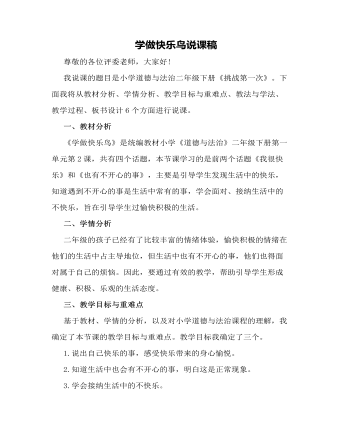
人教部编版道德与法制二年级下册学做快乐鸟说课稿
活动二:说出不开心的事首先,播放视频《我的烦恼》,学生会发现,自己不开心的事在他人身上也会出现。然后,学生说说自己还有什么不开心的事,教师相机引导。板书:生活中也有不快乐。设计意图:引导学生将自己遇到的不开心的事说出来,正确认识、接纳生活中的不快乐。活动三:快乐约定课件出示儿歌《快乐约定》,学生自己诵读,再齐读。设计意图:学以致用,形成积极乐观的生活态度。环节三:感悟明理,育情导行学生谈一谈学习本节课的收获,教师相机引导。设计意图:梳理总结,体验收获与成功的喜悦,内化提升学生的认识与情感。环节四:拓展延伸,回归生活把不快乐的事忘掉,把快乐的事记心里。设计意图:将课堂所学延伸到学生的日常生活中,有利于落实行为实践。




